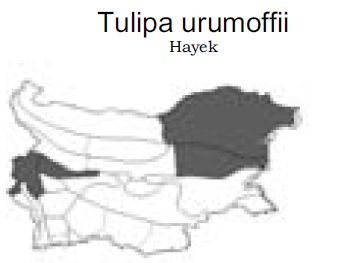home flora of romania endangered species of transylvania endangered habitats of transylvania
Tulipa hungarica Borbas
|
A splendid narrow endemic species from the Iron Gates area (the Danube's Defile while crossing the Carpathians). It grows also on the Serbian side in Djerdap National Park (see here). Actually the species seems to be the very same with Tulipa urumoffii Hayek from Bulgaria (see some excellent images of this here). This latter species has not any black dots at the base of the tepals as described in Ciocarlan (2009 p. 901). In this case it becomes a north Balkan element (see the map at the bottom of this page for the range of species (at the county level) in Bulgaria). Also Tulipa rhodopaea Vel. (see here and here) with showy bright red flowers (!) from southern Bulgaria and northern Greece is seen as a subspecies of Tulipa hungatica. For all these taxonomical aspects / synonymies from a genetical point of view see this article by Raamsdonk and Vries (1995) where the problem is treated in the broader context of Tulipa subgenus Tulipa. For some data regarding the ecology of Tulipa urumoffii Vel. in Bulgaria see this article .In regarging the color of the anthers and pollen in this species after our field investigations, it seems to be yellow and dark violet in equal proportions. Iron Gates area, Cazanele MIci and Mari and Ciucarul Mare areas, Almaj Mountains, Caras-Severin county, 27th of April 2013 dr. Alexandru-Sabin Badarau, alexandru@transsilvanica.net . Below there is an image of the famous Cazanele Mari which is also an international border area. To the right there is the Romanian shore (Iron Gates Natural Park) and to the left the Serbian side (Djerdap National Park). The species is now known from both sides.
Students from Babes-Bolyai University Cluj-Napoca during the field investigatios.
Iron Gates area, Cazanele MIci and Mari and Ciucarul Mare areas, Almaj Mountains, Caras-Severin county, 14th of April 2011. Claudia Istoc, isclau_a@yahoo.com In the photograph below there is the range of Tulipa urumofii in Bulgaria (actually the counties it was found within not the actual extension of the range) - after Assyov et al. (2006)- Conspect na visshata flora na Balgaria, Sofia.
Images of this species can be found here. |



























